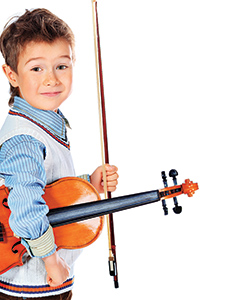Celebrating the 2019 CHADD Research Awards
THROUGH its Young Scientist Research Awards program, CHADD has supported emerging researchers for twelve years, encouraging excellence in the field and broadening our understanding of ADHD. The recipients of the 2019 Awards—Rosanna Breaux, PhD, and Samuel J. Eckrich, MS—were selected from a pool of highly qualified applicants by a team of seasoned ADHD researchers, which…
Read MoreMindfulness, ADHD, and Managing Emotions
A NEW STUDY* SHOWS BENEFIT TO CHILDREN WITH ADHD as young as seven years old when they practice mindfulness. Perhaps surprisingly, the study is not really about attention. Instead, the researchers measured improvements around behavior and emotion. That’s because neither ADHD nor mindfulness specifically have to do with focus. On a much grander level, both…
Read MoreWhat Makes a Good Accommodation?
PARENTS AND EDUCATORS OFTEN STRUGGLE when it comes to deciding whether or not to provide a child with an accommodation or modification. In giving a child a “leg up” or a “crutch” are we making them more dependent? Are we preventing them from trying their best? Are we giving them a message that they aren’t capable…
Read MoreWhy Can’t I Do This? How Emotional Intelligence and Self-Regulation Pay Off for Adults with ADHD
WHEN WAS THE LAST TIME you experienced a set of emotions so intense that they overtook your mind, resulting in a lack of normal functioning? Perhaps you blanked in a job interview, shut down during an exam, or spent days wiped out after the emotional explosion with your kids or your spouse. Perhaps it’s been…
Read MoreHow to Be Angry Better
MANY OF US, INCLUDING SOME PEOPLE WITH ADHD, have anger behavior problems. We know emotional dysregulation is a common reason for this. In their study on ADHD and emotional dysregulation, Philip Shaw and his colleagues define it as “an individual’s ability to modify an emotional state so as to promote adaptive, goal-oriented behaviors.” To modify…
Read MoreWhat’s Up with All This Anger?
Here’s how you can reduce your frustration, manage intense feelings, and live with more contentment. YOU KNOW THE MOMENT. The moment when something goes wrong or someone says a few words that set you off. A switch has flipped and suddenly there’s a bubbling volcano of angry, negative emotions inside of you waiting to erupt.…
Read MoreSmartphones in School? A Voice for Change
AS A PARENT COACH AND TEACHER TRAINER, I deal with the challenges created by electronic devices and social media on a daily basis. Parents struggle to set appropriate limits, kids have a hard time regulating their usage, and educators need to manage the balance between using these devices as tools and the unintended consequences they…
Read MoreSpontaneous or Impulsive? How to Know, What to Do
MOST OF US CRINGE WHEN WE HEAR THE WORD IMPULSIVITY, as it brings to mind what our impulsive decisions or behaviors have resulted in. Impulsivity can cause accidents, inefficiency, poor performance reviews at work, and adversely affect treasured relationships. What is impulsivity and how does it differ from spontaneity? Most of us like being spontaneous,…
Read MoreWhy Does Sam Struggle with School Projects?
Executive Functions and Academic Achievement WHY DO MANY STUDENTS, including those with average and above intelligence and no diagnosed or known learning or developmental disability, struggle with academic performance? While there is no simple response to this vexing question, the answer is often rooted in executive functioning deficits. Executive functions, often synonymous with the term…
Read MoreEmotional Aspects of ADHD
THIS COLUMN focuses on emotional aspects of ADHD, including a study on the effects of a preschool intervention on parental negativity and another that examined child physiological markers of emotion and behavior regulation. ADHD & EMOTIONAL UNDERSTANDING How do ADHD symptoms impact emotion understanding, reactivity, and regulation? In this study, researchers compared young children who…
Read MoreHome Again: What to Expect When Your Adult Child with ADHD Returns Home to Live
ADULT CHILDREN ARE RETURNING HOME in greater numbers than ever before. Nearly one in eight adults returns to their parents’ home. There are many reasons for their return home, including crushing financial student debt and an inability to find a job or obtain an initial foothold in an entry-level career, necessitating a try at graduate…
Read MoreEmotion Regulation and ADHD
In this issue, our research update focuses on the role of emotion and emotion regulation in individuals with ADHD symptoms. EMOTIONAL FUNCTIONING How are childhood ADHD symptoms related to emotional and peer problems? Instead of focusing on children diagnosed with ADHD, this study looked at the relationship between ADHD symptoms, emotional functioning, and peer problems…
Read More









